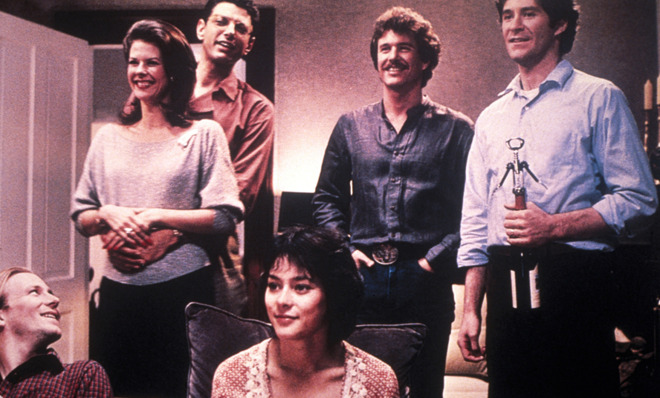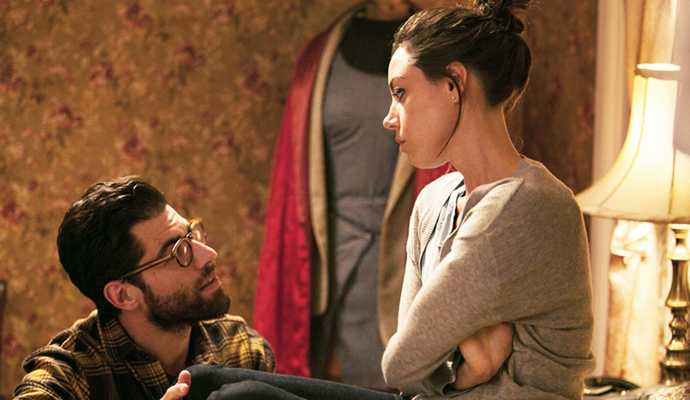Why The Big Chill still matters
More than 30 years after its original release — and with About Alex, a spiritual successor, hitting theaters — the 80s drama remains both relevant and relatable


More than 30 years after its original run at the box office, Lawrence Kasdan’s reunion classic The Big Chill is back on shelves in a flashy new Criterion release. The film remains a divisive cultural touchstone; some reflect on it with nostalgia, while others heap scorn on it. It is both an iconic film that appealed to scores of soul-searching adults desperate to connect, and a problematic poster-child for a privileged, uber-white Baby Boomer mindset that continues to infect both film and society.
The Big Chill follows a group of old college buddies who reunite after a mutual friend's suicide. As they fall back on the postures of their youth, they face the reality of their present, with problems ranging from the serious scars of war, to the angst of success without personal fulfillment.
Given the current state of the economy, there’s something almost absurd about seeing this group of wildly successful people — a business owner, a lawyer, a doctor, and an affluent journalist — complain about the difficulty of their lives. (The "loser" of the crew is a drug dealer in a beat-up car, which happens to be a Porsche.) Despite their personal dissatisfaction, these characters are settling into lucrative, Reagan-era financial success, scoring their lily-white lives to Motown music while partying on an antebellum plantation.
The Week
Escape your echo chamber. Get the facts behind the news, plus analysis from multiple perspectives.

Sign up for The Week's Free Newsletters
From our morning news briefing to a weekly Good News Newsletter, get the best of The Week delivered directly to your inbox.
From our morning news briefing to a weekly Good News Newsletter, get the best of The Week delivered directly to your inbox.
But for all the film's navel-gazing, The Big Chill represents a cinematic move from a more radical, blue-collar world to the distinctive mix of dissatisfaction and privilege that characterized the 1980s. The Big Chill was an emblem of that era, and has become a valuable relic. The film's characters embodied the switch from activism to conservatism, as well as the struggle to reconcile these antithetical leanings, and they did it while exploring relatable human urges.
"These are your parents," Lena Dunham writes in a new essay commissioned for the Criterion release. She relates to the humanity The Big Chill reminds us of — the personality, camaraderie, and idealism that came before responsibility. "When I lost touch with this group...I lost my idea of who I should be," says Tom Berenger's Sam in a key scene. The friends use the suicide to try and return to the source of their lives (and the disc follows suit, with multiple cast reunions revisiting the material 15 and 30 years later).
Over and over, The Big Chill's characters think "about Alex," the friend whose inexplicable suicide brought them together in the first place, as they wonder about his motives and use his suicide to revisit and examine their past selves. It's a refrain that continues today in Jesse Zwick’s directorial debut, About Alex, which arrives in theaters and on video-on-demand this week.

Zwick has attempted to downplay the connection between the two films, stating: "The Big Chill is a movie that I love and it definitely shares a premise in the sense that it’s about a reunion of old friends brought together by a tragic event, but it goes in a different direction."
A free daily email with the biggest news stories of the day – and the best features from TheWeek.com
But while it's not a remake of The Big Chill, About Alex is certainly an homage to it. Once again, a suicidal Alex brings a group of college friends together — but this time, he survives his attempt.
Save a few key differences, About Alex uses The Big Chill’s basic setup to explore the world of post-graduate life and adulthood in the new millennium. There is the same remote setting, distinctive music, and dance scenes; conversations held under a haze of marijuana; and a young girlfriend whose life is cunningly juxtaposed with her older and supposedly more adult companions. It even throws in its own version of the scene that was famously cut from The Big Chill: a flashback to the friends' college days, which would have been Kevin Costner's big-screen debut.
But About Alex's narrative mimicry isn't a bad thing. In a cinematic culture that demands repetition and re-imagination, About Alex takes an old idea and offers its own riff. Too often, modern films prey on nostalgia with reboots that barely resemble the original work (like the Endless Love remake, which ignored the entire focus of its source material in favor of a melodramatic teen love story). Instead, About Alex reminds us of the power in resurrecting an idea without forcing old characters into a new world. It nods to its obvious predecessor without insistently following it — or worse, so wretchedly diverging from it that the remake manages to undo what was worthwhile about the original.
Despite their age difference, The Big Chill and About Alex are examples of a certain timelessness: no matter how much society and personal circumstances change, we still desire connection. In one of the Criterion interviews, The Big Chill director Kasdan talks about looking for people "who understand you. Who get you. And when you leave that — when you're on your own to go out into that world which is very cold and tough — if you could no longer find a group like that, it’s lonely, and people miss it like crazy."
It’s an idea that's still relevant more than 30 years later. It lives on in the tragedies that still bring old groups together, and in our modern, connected world — in every attempt to connect with the like-minded through social media, or "friend" every person from your past, so you don't forget who you used to be. The methods have evolved, but the intent remains the same — and as long as we continue to desire camaraderie and connection, The Big Chill will always be relevant.
Monika Bartyzel is a freelance writer and creator of Girls on Film, a weekly look at femme-centric film news and concerns, now appearing at TheWeek.com. Her work has been published on sites including The Atlantic, Movies.com, Moviefone, Collider, and the now-defunct Cinematical, where she was a lead writer and assignment editor.
-
 World’s oldest rock art discovered in Indonesia
World’s oldest rock art discovered in IndonesiaUnder the Radar Ancient handprint on Sulawesi cave wall suggests complexity of thought, challenging long-held belief that human intelligence erupted in Europe
-
 Claude Code: the viral AI coding app making a splash in tech
Claude Code: the viral AI coding app making a splash in techThe Explainer Engineers and noncoders alike are helping the app go viral
-
 ‘Human trafficking isn’t something that happens “somewhere else”’
‘Human trafficking isn’t something that happens “somewhere else”’Instant Opinion Opinion, comment and editorials of the day
